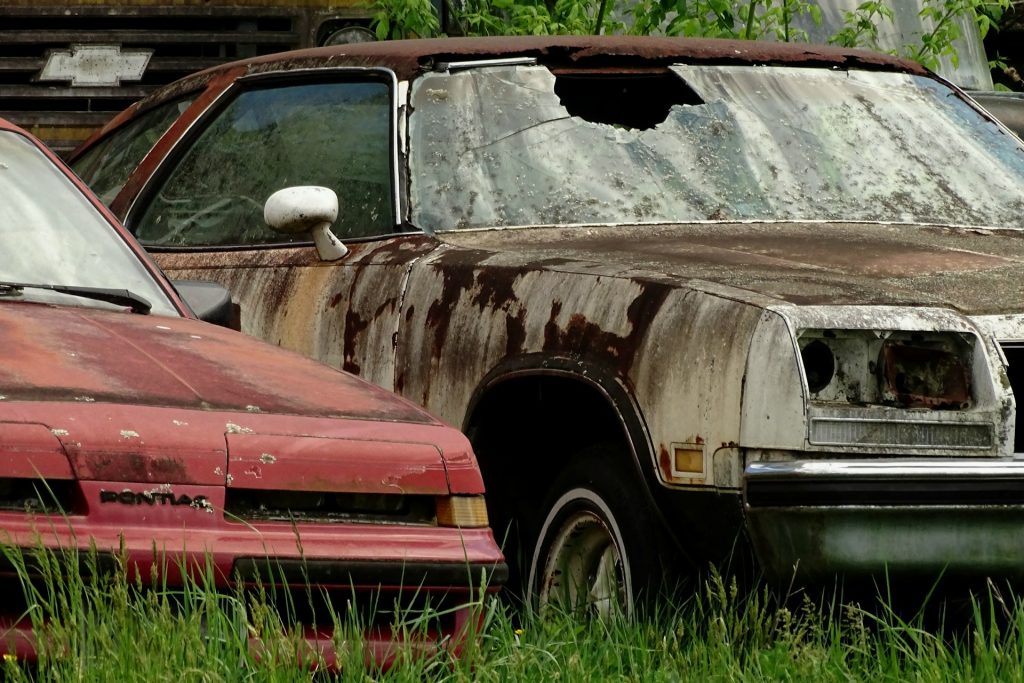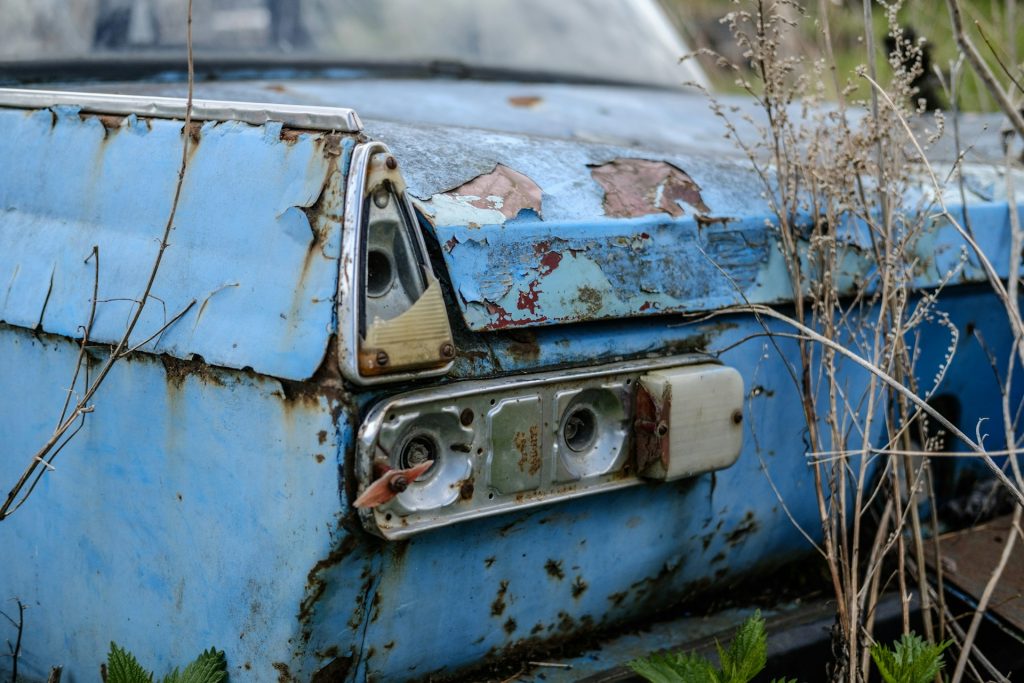Navigating the valuation of a salvage title car is challenging. This guide by A Better Bid aims to clarify how to accurately determine its worth. It’s designed to assist both buyers and sellers. By the end, making well-informed decisions about salvage title cars should become more straightforward. Understanding their true value is essential for anyone considering buying or selling such a vehicle.
Table of Content
- What Is A Salvage Vehicle?
- Factors Affecting the Value of a Salvage Car
- Brand and Model
- Condition
- Age
- Location
- Market Trends
- Salvage Value vs. Actual Cash Value
- Definitions to Learn
- Methods to Determine the Value of a Salvage Car
- Determining Value Based on a Non-Salvaged Price
- Options for the Car Appraisal
- Insurance Company Assessment
- Selling a Car with a Salvage Title
- Preparing for Sale
- Summary
- FAQ
What Is A Salvage Vehicle?
Insurance companies declare cars as salvage vehicles when repair costs exceed their value. Despite this, not all is lost for these cars. Many are bought, repaired, and reused. A salvage title indicates the car has a history of significant damage. It’s a mark that stays with the vehicle for life. However, this doesn’t necessarily mean the car is unsafe. Many salvage title cars return to the road in good condition. They can be excellent options for those looking for a cheaper vehicle. Knowing a car’s salvage status helps in making an informed purchase or sale.
Factors Affecting the Value of a Salvage Car
The value of a salvage car depends on various factors. Its condition, age and the make and model play significant roles. The car’s location and current market trends also influence its worth. For sellers and buyers alike, understanding these factors is crucial. They directly impact the car’s marketability and resale value. Salvage cars can range widely in value. Some may be nearly as valuable as their non-salvaged counterparts. Others might be worth only their parts. Evaluating these factors carefully helps in determining a fair price.
Brand and Model
Brand and model significantly affect the value of a salvage car, much like they do for antique cars and used cars. Certain brands and models, due to their popularity or rarity, can maintain a higher value of the vehicle, even when labeled as salvage. For buyers and sellers aiming to get an accurate idea of a salvage car’s worth, recognizing the importance of the brand and model is key. Many cars, despite being salvaged, can still command a considerable amount of money if they belong to sought-after brands or models. This aspect is crucial for making informed decisions in the salvage car market.
Condition

Condition dramatically shapes the value of a salvage car. An inspection by a qualified mechanic can decide its fate. This examination reveals the percentage of the car still in good condition and the cost of necessary repairs. Knowing these details helps in evaluating the car’s overall worth. Often, the cost of repairs can significantly influence a buyer’s decision. A thorough check by a mechanic ensures buyers and sellers have a clear understanding of the vehicle’s state. This clarity is essential in negotiating a fair price, reflecting the salvage car’s true condition and potential.
Age
Age is an important point in determining a salvage title vehicle’s value. Older vehicles, especially those requiring extensive repairs, may not justify the cost when compared to their current market value. However, salvage yards and repair shops sometimes find higher value in older models for rare parts. The age can either increase or decrease a vehicle’s worth significantly. In essence, the balance between the cost of repairs and the potential return is crucial. This balance is especially true for classic or antique vehicles, where their age might add to their allure, influencing their valuation in the salvage market.
Location

Location means a lot in the salvage car market, affecting both the demand for salvage parts and the value of a used car. Dealers, aiming for profit, must accurately assess this aspect to calculate potential earnings. For example, a vehicle’s parts might be more valuable in areas where that model is popular or scarce. This geographical demand can substantially influence the price a dealer sets for salvage parts or the entire vehicle. Understanding the local market and its needs allows sellers to position their salvage cars and parts more strategically, maximizing their return in specific locations.
Market Trends
Market trends significantly influence the process of determining a salvage car’s value. Insurance companies often calculate a percentage of the car’s market value when dealing with a salvaged vehicle. This figure helps set the groundwork for any compensation or resale price. The fluctuating market can affect the demand for certain vehicle types or parts, thereby impacting their value. For instance, a car that’s popular or in demand can have a higher salvage value, even if it’s significantly damaged. Understanding these trends is essential for sellers aiming to maximize their return and buyers looking to invest wisely in a salvage vehicle.
Salvage Value vs. Actual Cash Value
Salvage value and actual cash value (ACV) are two different concepts. Salvage value refers to the estimated resale price of a car after being declared a total loss. ACV, on the other hand, is what the car was worth before sustaining damage. These values are critical for insurance claims and negotiations. They also play a role in the buying and selling process. Understanding the difference helps in setting realistic expectations. Anyone dealing with salvage title cars needs to grasp these terms. They are foundational in the world of vehicle resale and insurance settlements.
Definitions to Learn
Definitions of terms like wholesale value, retail value, and estimated value become crucial when discussing a totaled car from an accident. The wholesale value refers to the price a dealer might pay to acquire the vehicle, usually lower than retail. Retail value is the price a consumer might pay to buy the car from a dealership. The estimated value is often used by insurance companies to determine the payout amount. When owners decide to sell a salvage vehicle, understanding these values helps them set a realistic price. It also ensures they are adequately compensated if choosing to accept an insurance payout.
Methods to Determine the Value of a Salvage Car
Several methods exist to determine a salvage car’s value. Online valuation tools provide quick estimates. Professional appraisals offer more detailed assessments. Comparing the car to similar models in the market can also be helpful. Each method has its strengths and limitations. For a seller, setting the right price is vital. For a buyer, knowing the value ensures a good deal. Combining these methods often yields the most accurate valuation. It’s about finding the right balance between what’s practical and what’s precise. This approach helps in reaching a fair and informed valuation.
Determining Value Based on a Non-Salvaged Price
To estimate a salvage car’s value, start with its non-salvaged price. Then, subtract repair costs and factor in depreciation. This method isn’t perfect but gives a ballpark figure. Consider the car’s condition and remaining lifespan too. These adjustments reflect the impact of past damages and repairs. They’re crucial for setting a realistic price. For buyers, this calculation aids in negotiating. For sellers, it helps in listing the car at a fair price. Understanding these adjustments is key to dealing with salvage title cars. It ensures everyone involved makes informed decisions.
Options for the Car Appraisal

Several avenues exist for appraising a salvage title car. Insurance company assessments provide one option. Independent appraisers offer another, often with a more unbiased viewpoint. Online estimation tools can also give a ballpark figure. Each option varies in detail and accuracy. Insurance assessments might focus on minimizing payout. Independent appraisers could offer a more market-reflective value. Online tools are quick but less personalized. Choosing the right appraisal method depends on the situation. For selling, a detailed appraisal might fetch a higher price. For buying, diverse appraisals help in making a fair offer. Understanding these options is crucial for accurate valuation.
Insurance Company Assessment
When an insurance company assesses a salvage car, several factors come into play. The insurance company declares a vehicle a salvaged vehicle based on the cost of repairs versus the value of the vehicle. This determination directly affects the insurance coverage and the potential payout. Typically, the company will calculate the salvage car’s value, considering its condition pre-accident and the cost to return it to a roadworthy state. This process ensures that both the insurer and the insured have a clear understanding of the car’s worth. It’s a crucial step for owners deciding whether to repair, sell, or accept an insurance payout for their salvaged vehicle.
Selling a Car with a Salvage Title
Selling a salvage title car requires honesty and strategy. Full disclosure of the vehicle’s history is essential. It builds trust with potential buyers. Preparing the car for sale involves making it presentable and gathering all repair documents. Marketing the car effectively also plays a role. Highlight its strengths, such as recent repairs or new parts. When negotiating, be prepared to justify your asking price. Use your appraisal to back up your valuation. Successfully selling a salvage title car means finding the right buyer. It’s about matching someone who sees the value beyond the title.
Preparing for Sale
Preparing a salvage title car for sale involves obtaining an accurate estimate of its fair market value. This often requires a visit to a repair shop, where professionals can evaluate the total cost of any necessary repairs. Additionally, ensuring the car meets all safety standards, especially if it has been involved in a natural disaster, is crucial. Spare parts can significantly impact the vehicle’s appeal and functionality. Providing potential buyers with a comprehensive breakdown of the car’s condition, repair history, and any replacement parts enhances transparency. This preparation not only helps in justifying the asking price but also in building a strong case for the car’s value, making it more attractive to prospective buyers.
Summary
The value of a salvage title car is nuanced. It’s not just about the damage or the repairs. It’s about understanding the market, the car’s potential, and its past. For sellers, it’s about presenting the car in its best light. For buyers, it’s about seeing the opportunity in a salvage title. This article aims to explain the process of valuing these vehicles. Whether buying or selling, the key is informed decision-making. With the right knowledge and approach, salvage title cars can represent a worthwhile investment.
![]() FAQ
FAQ
Show more
Does Salvage Value Change Over Time?
Yes, salvage value can change. Market demand, vehicle condition, and economic factors play roles. As such, a salvage car’s worth isn’t static.
What Is the Difference Between Scrap Value and Salvage Value?
Scrap value is the car’s worth in parts only. Salvage value considers the entire car, including potential repairs. It’s higher than the scrap value. The distinction is important for selling and insurance purposes. It affects the car’s overall valuation.
How Much Value Does a Car Lose When It Has a Salvage Title?
A salvage title typically reduces a car’s value by 20% to 40%. The exact amount depends on the vehicle’s condition and market demand. This depreciation is a key consideration in buying and selling.
Recommended Articles
:format(webp)/vulcan.abetter.bid%2Fwp-content%2Fuploads%2F2024%2F01%2Fmc-kontext-WKl8K3zOwmk-unsplash.jpg)

:format(webp)/vulcan.abetter.bid%2Fwp-content%2Fuploads%2F2024%2F03%2Fartem-beliaikin-vAh9TyyI7wM-unsplash.jpg)
:format(webp)/vulcan.abetter.bid%2Fwp-content%2Fuploads%2F2022%2F10%2F2022-10-05-11.30.40-150x150.jpg)
 FAQ
FAQ :format(webp)/vulcan.abetter.bid%2Fwp-content%2Fuploads%2F2024%2F02%2Fjakub-nawrot-3FYqzBCSLHQ-unsplash.jpg)
:format(webp)/vulcan.abetter.bid%2Fwp-content%2Fuploads%2F2025%2F12%2Fcopart-vs-manheim-cover-1.png)
:format(webp)/vulcan.abetter.bid%2Fwp-content%2Fuploads%2F2025%2F11%2Fautobidmaster-vs-copart-1.png)
:format(webp)/vulcan.abetter.bid%2Fwp-content%2Fuploads%2F2025%2F11%2Fa-better-bid-vs-autobidmaster.png)

